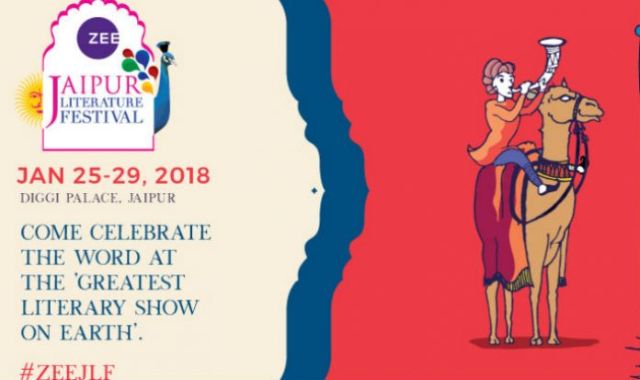By Namita Gokhale,
For me, the idea of India resides in her Sahitya, in her words, her poetry, her songs, and the oldest, richest and most diverse traditions of oral and textual literature in the world. India lives in her languages: Twenty-two scheduled languages, including English, six classical languages — Sanskrit, Tamil, Telugu, Kannada, Malayalam and Odia; 122 spoken languages, 1,635 classified mother tongues, and 1,957 pending classification. This vast linguistic landscape is the backdrop for the annual ZEE Jaipur Literature Festival.
As the eleventh edition of the ZEE Jaipur Literature Festival approaches, I look back at the last decade, where, in the month of Magh, we have consistently celebrated both the unity and diversity of Indian literature. I am struck afresh by the number of extraordinary writers from the Indian languages that we have had the privilege of hearing in the beautiful precincts of the Diggi Palace.
There is a generation of great and inspiring writers gone by, like the late Mahasweta Devi, who delivered the evocative keynote speech in 2013, my dear friend U.R. Ananthamurthy, who addressed us at the opening of the 2009 edition, and the incomparable Sunil Gangopadhyay, who was with us in the same year. I remember chatting with them outside the Durbar Hall and their childlike enthusiasm for the vibrant energy of the festival. In 2013, when he was to speak once again at the festival, Sunil da had left the world, and U.R. Ananthamurthy, who had been shortlisted for the DSC Prize for South Asian Writing in 2012 as well as the Man Booker international award in 2013, (both of which were announced at our festival) was unable to attend because of ill health. Last year, octogenarian S.L. Bhyrappa, best-selling Kannada writer and revered literary figure, was in conversation with Vivek Shanbhag, Ananthamurthy’s son-in-law, whose Kannada fiction has had a worldwide impact.
Across languages, across generations, the rooted traditions of Bhasha writing and the heritage of the Indian languages continue to enrich each other, and the ZEE Jaipur Literature Festival, with its predominantly young audiences, (60 per cent of our audiences are under 25) remains a crucial platform for the young to read and encounter these legendary names. Be it the great Rajasthani writer and scholar Rani Lakshmi Kumari Chundawat, who was at our festival in 2012 and 2013, before she died in 2014 at the age of 93; or Vijaydan Detha, ‘Bijji’ to his adoring fans, who addressed us via a film shot by the brilliant Hindi writer Uday Prakash, our festival remains a crucial space for honouring the languages and literature of India.
We are equally invested in folk cultures, narratives and the oral traditions. The great maestro of Rajasthani Dingal poetry and performance, Shakti Dan Kaviya, has performed at Jaipur, as have the late Mohan Bhopa, Ghafaruddin Mewati, the last custodian of the Pandoon ka Kada traditions of the Mewati Mahabharata, and so many others.
Our festival celebrates both the heritage and the evolution of Hindi, in its many dialects and nuances. Ashok Vajpeyi, Narendra Kohli, Om Prakash Valmiki, Chitra Mudgal, Mridula Garg, Alka Saraogi, Pushpesh Pant, Mrinal Pande, Uday Prakash, as well as the next generation that includes Ravish, Shazi Zaman and Yatindra Mishra, have been friends and well wishers of what has been described as “Sahitya ka Mahakumbh”.
Be it Volga and C. Mrunalini in Telugu; Dhrubajyoti Bora, Anuradha Pujari Sarma, Arupa Kalita Patangia and Aruni Kashyap in Assamese; Pratibha Ray and J.P. Das in Odia; Bama, Salma, Charu Nivedita and Perumal Murugan in Tamil; the greats of Indian literature have graced us with their presence. K. Satchidanandan, Paul Zachariah, K.R. Meera, Sethumadhavan, as well as the towering figure of M.T. Vasudevan Nair, have all been speakers at the festival. The video recordings of their sessions provide an accessible and invaluable video resource for the understanding and study of literary traditions.
Each of the Indian literatures carries rich historical and aesthetic traditions, with the languages rooted in their physical and cultural geography. The writing that is emerging in these many avatars is dynamic and contemporary. It is full of questioning, sometimes anger, but it also carries a continuity of thought and identity.
India exists in a constant and ongoing state of translation. Quality literary translation from source languages is the key to understanding and facilitating exchange between the Indian Bhasha writing. Jaipur Bookmark, the publishing segment of the festival, has provided steadfast support to publishers and translators and acted as one of the catalysts and enablers for changing on-ground attitudes.
The ZEE Jaipur Literature Festival and countless other valuable literary events and initiatives across the Indian subcontinent have helped establish a literary community, forged through language and the intangibles of culture, establishing a common matrix of understanding. The idea of many languages and one literature continues to hold true.
(Namita Gokhale is one of India’s foremost authors and co-director of the upcoming Zee Jaipur Literature Festival. The views expressed are personal. She can be contacted at jlf@teamworkarts.com)
—IANS







 Google News
Google News